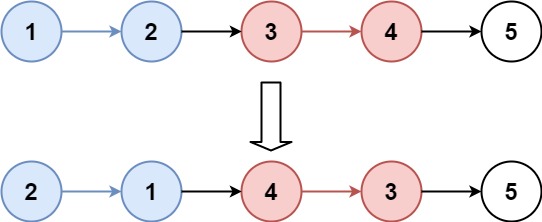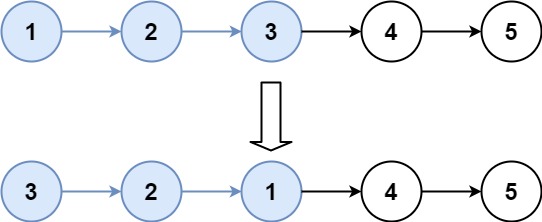LeetCode-in-All
25. Reverse Nodes in k-Group
Hard
Given a linked list, reverse the nodes of a linked list k at a time and return its modified list.
k is a positive integer and is less than or equal to the length of the linked list. If the number of nodes is not a multiple of k then left-out nodes, in the end, should remain as it is.
You may not alter the values in the list’s nodes, only nodes themselves may be changed.
Example 1:

Input: head = [1,2,3,4,5], k = 2
Output: [2,1,4,3,5]
Example 2:

Input: head = [1,2,3,4,5], k = 3
Output: [3,2,1,4,5]
Example 3:
Input: head = [1,2,3,4,5], k = 1
Output: [1,2,3,4,5]
Example 4:
Input: head = [1], k = 1
Output: [1]
Constraints:
- The number of nodes in the list is in the range
sz. 1 <= sz <= 50000 <= Node.val <= 10001 <= k <= sz
Follow-up: Can you solve the problem in O(1) extra memory space?
Solution
#include <stdio.h>
#include <stdlib.h>
/**
* Definition for singly-linked list.
* struct ListNode {
* int val;
* struct ListNode *next;
* };
*/
// Function to create a new ListNode
struct ListNode* createNode(int val) {
struct ListNode* node = (struct ListNode*)malloc(sizeof(struct ListNode));
node->val = val;
node->next = NULL;
return node;
}
// Function to reverse nodes in groups of k
struct ListNode* reverseKGroup(struct ListNode* head, int k) {
if (head == NULL || head->next == NULL || k == 1) {
return head;
}
// Check if there are at least k nodes remaining
struct ListNode* len = head;
int j = 0;
while (j < k) {
if (len == NULL) {
return head;
}
len = len->next;
j++;
}
// Reverse the first k nodes
struct ListNode* curr = head;
struct ListNode* prev = NULL;
struct ListNode* next = NULL;
int i = 0;
while (i < k) {
next = curr->next;
curr->next = prev;
prev = curr;
curr = next;
i++;
}
// Recursively call for the next group of k nodes
head->next = reverseKGroup(next, k);
return prev;
}

